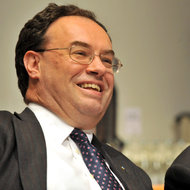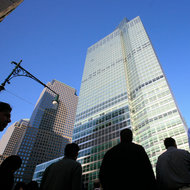 Georges Gobet/Agence France-Presse — Getty ImagesAndrew Bailey in 2009.
Georges Gobet/Agence France-Presse — Getty ImagesAndrew Bailey in 2009.
Andrew Bailey, the future chief of the Prudential Regulation Authority, a newly created British regulator, believes that some banks have become too big to prosecute.
The fear, one that has been echoed in the United States, is that the indictment could hurt confidence in the wider financial services industry.
“It would be a very destabilizing issue. It’s another version of ‘too important to fail,’” Mr. Bailey told The Telegraph, a British newspaper.
A number of British banks, including HSBC and Barclays, have recently been forced to pay large fines connected to illegal activity by some of their employees. Mr. Bailey said the size of many financial institutions made it difficult to take legal action against firms.
American authorities recently decided against indicting HSBC over money laundering, over concerns about the broader financial system. Instead the bank agreed to pay $1.92 billion to settle the matter.
The case is raising some questions. On Thursday, Senator Charles E. Grassley, Republican of Iowa, sent a letter to Eric H. Holder Jr., the attorney general, citing the Justice Department’s “inexplicable unwillingness to prosecute and convict those responsible for aiding and abetting drug lords and terrorists.” Mr. Grassley called the HSBC fine “hardly even a slap on the wrist,” given the bank’s profits.
Article source: http://dealbook.nytimes.com/2012/12/14/british-regulator-says-banks-too-big-to-prosecute/?partner=rss&emc=rss
